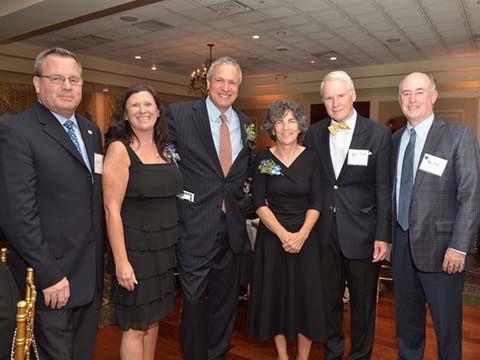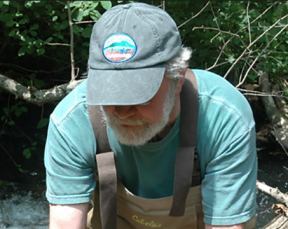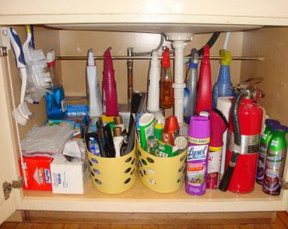

I’m here tonight because, having grown up along the degraded lower stretch of the Passaic, I had a burning question: How did a river that was once celebrated for its beauty become an EPA Superfund site?
In my quest to find an answer, I found Andy Willner, who at the time was still the executive director of the NY/NJ Baykeeper Association. I’m sure many of you know Andy.
He told me that the Passaic’s biggest problem was that it had become a stranger to the people who lived in its watershed. That people didn’t know the river any more, and that you can’t love something that you don’t know.
Up to that point, I had thought of the Passaic as the dark and menacing monster of my youth. Andy helped me see that the Passaic wasn’t a monster at all. It was a victim. A victim of our own greed and ignorance and complacency and shortsightedness.
Andy was an advocate. And that’s what advocates do: They tell us things we didn’t know. Using reason and passion and eloquence and persistence — and maybe a lawsuit here and there — they help us to see a truth about the world, and about ourselves.
They traffic in epiphanies.
Advocates like those of you here tonight are a rare and precious breed. Because you possess two qualities that are in such short supply these days they seem almost magical: The capacity to imagine a different, better future, and the patience to make that future happen.
You are dogged, longterm dreamers.
We all live in a watershed. Everybody on this planet does. Our addresses never acknowledge this basic fact of nature. And water, for its part, doesn’t acknowledge the neat little boundaries we insist on drawing around our yards and towns and counties and states and countries. Water doesn’t even observe its own boundaries; it has a nasty habit of spilling over its banks and wandering out across and sometimes beyond its floodplain.
The Passaic is a perfect example of that: Water as a rogue force. Elemental and utterly essential. We would be wise to start meeting water on its own terms.
When Sally told me that the Great Swamp Watershed Association was expanding its mission to embrace the whole Passaic — “source to sea” — I was thrilled. This is a big deal. And I applaud the Association’s board and staff for the decision to scale up. That took courage and foresight.
We all know that what happens in Mendham doesn’t stay in Mendham. It flows downstream to Gillette and New Providence.
What happens in Morristown and Wayne flows down the Whippany and the Pompton river tributaries to Passaic River towns like Little Falls and Paterson.
Because the Passaic is a tidal, what happens in Newark Bay has consequences for the people upstream in places like North Arlington where I grew up and Lyndhurst where we’ve already found dioxin.
It’s all about watershed. And you know that. It’s right there in the title of your organization.
So when Sally told me that the Great Swamp Watershed Association had also joined the ranks of the region’s riverkeepers — I realized that this is truly a watershed moment. Pun intended.
And not just for the Passaic, but for the entire region.
The keeper alliance is at full strength now: With the Hackensack Riverkeeper, the Raritan Riverkeeper, the NY/NJ Baykeeper and now a Passaic Riverkeeper — hey, you’re just one boat away from the title — we now have veteran environmental organizations looking out for all the region’s waterways. Our majestic, historic rivers, bays and estuaries. The whole damn plumbing system.
These organizations need and deserve your financial support. Because if they can work together to educate and evangelize and lobby and police, we could be looking at a real a paradigm shift.
People living in these watersheds, along with their elected officials, and agency heads, all the cooks in all the kitchens, will start to scale up their own perspectives on water. To see themselves as citizens, not just of towns and counties, but of watersheds.
Once that shift occurs, once the epiphany happens, it will snowball. Communities will begin to think bigger and more holistically about how they use and manage and protect this resource that is so precious we literally cannot live without it.
Many of us — and I include myself here — have come to accept a certain level of environmental degradation as the norm, as inevitable. But what if it isn’t? What if water quality and quantity didn’t always have to take a back seat to growth and economic development? Or your lawn?
What if water quality and quantity were the foundation of economic growth and development?
What if we could change the calculus? What if we could change?
The hope for that kind of sweeping change, for a future with healthy, sustainable, beautiful watersheds lies with people like you. And it’s a huge responsibility.
Convincing your fellow citizens to treasure instead of trashing the Passaic — and all of New Jersey’s waterways — is hard, hard work and it’s going to take a long, long time.
It probably won’t happen in our lifetimes. You know that.
The advocate Frances Lappe, who wrote the book Diet for a Small Planet, said once that if you are actually able to accomplish your goals in your own lifetime then your goals probably weren’t ambitious enough.
Well, creating healthy, sustainable, beautiful watersheds is definitely ambitious enough. And it IS possible.
I believe that we’ll look back on 2016 as the time we took a giant step toward achieving that goal.
I believe we’ll look back on 2016 as a pivotal year in the health of the Passaic River, when the concept of watershed began to enter the mainstream consciousness.
I believe that by embracing its new “source-to-sea” mission and joining the riverkeeper family, the Great Swamp Watershed Association has not only imagined a bold new future for itself, it has launched us all into an exciting new age.
The age of thinking big.
The age of thinking holistically.
Of thinking naturally.
The Great Age of the Watershed.
And I can’t wait to see what happens next.


